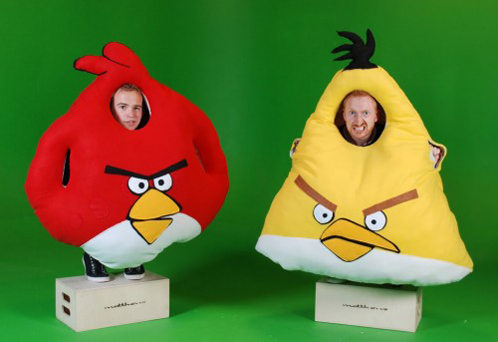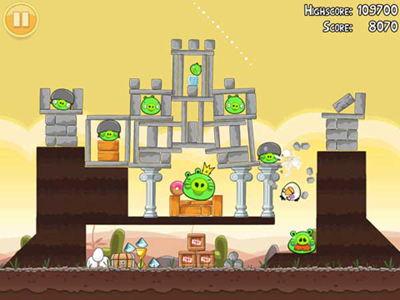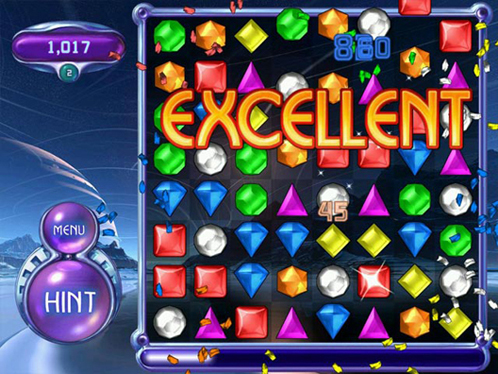华尔街日报:促进心理健康,休闲游戏受热捧
为什么聪明的人却会喜欢玩看起来有点低智商的游戏呢?手机游戏《愤怒的小鸟》(Angry Birds)是休闲游戏圣坛中的又一部力作,它令人上瘾的玩法、独特的游戏设计,以及精明的市场营销策略,已经虏获了无数粉丝。这类休闲游戏一般时间长度较短,被业内人士称为“娱乐小点心”,它甚至可以让成人用户在许多场所毫不避讳地掏出手机,旁若无人地玩起游戏。像《愤怒的小鸟》这类游戏一般都包含可爱、温馨的画面,很逗人的音效,以及取悦玩家的奖励系统。2008年的一项科学研究发现,休闲游戏还可以“分散”玩家的注意力,使他们心情好转,提高抗压水平。
休闲游戏的定义来源于它们即时体验的特点,为包括PC硬核游戏玩家、掌机游戏玩家在内的许多用户提供了便捷的休闲娱乐体验。这类游戏的代表作有早期针对PC和掌机平台的名作《俄罗斯访块》(Tetris),以及历时十年仍广受手机用户欢迎的《宝石迷阵》(Bejeweled)等。去年由PopCap Games公司赞助的一项调查表明,在1100多名AT&T无线服务的手机用户中,游戏玩家的平均年龄是45岁,男性、女性玩家比例也相当均衡。当问到受访者在什么情况下会玩手机游戏时,他们最为统一的答案是:约会等人的时候。
《愤怒的小鸟》可不简单,它还成功地笼络了一群社会精英级别的粉丝。据英国游戏产业贸易组织主席安迪·佩恩(Andy Payne)透露,英国新任首相大卫·卡梅伦(David Cameron)也经常在自己的iPad上玩这款游戏(不过首相本人的新闻发言人拒绝回应此事)。印度作家萨尔曼•拉什迪(Salman Rushdie)在最近的一次广播采访中甚至自称是“《愤怒的小鸟》的游戏高手”;美国喜剧演员、脱口秀主持人科南·奥布莱恩(Conan O’Brien)也在YouTube上传的一个视频中,不无得意地吹嘘自己已经闯到《愤怒的小鸟》的第四关。
加拿大不列颠哥伦比亚省的一名34岁的家庭主妇Amber Strocel,在几个月前买了一部iPhone手机后,就开始接触《愤怒的小鸟》,从此便一发不可收拾,经常在做饭前玩游戏打发时间。她表示在前几年,自己从来不玩游戏,但见到《愤怒的小鸟》就对游戏中的卡通形象,尤其是夹杂笑声和小猪呼噜声的音效特别着迷。不过,玩家对这类游戏的兴趣也有一个保鲜期,如果游戏功能的创新性消失了,玩家也会开始兴味索然。Strocel最近就已经改玩其他游戏,原因是她已经闯过了所有的关卡。
芬兰开发商Rovio公司董事长Mikael Hed称《愤怒的小鸟》的成功“是所有细节组合的结果”,比如犀利而不失可爱的形象、搞笑的声音效果和简单的游戏规则等。Rovio公司于2009年初开始构思这款游戏的主角,即一群看起来很冷酷的小鸟,并决定将游戏的反派设置为一帮有点病态的绿色小猪,隐喻当时全球都在热议的猪流感。至于这些鸟儿为什么仇恨小猪,该游戏故事背景的解释就是,小猪们想把鸟蛋盗走煮了吃。
据Rovio公司的发言人表示,该公司在开发《愤怒的小鸟》原始版本时投入了10万美元左右,推出游戏升级以及免费更新版本时又耗了一笔钱。
Hed表示,通过口碑营销,该游戏于去年末登上了芬兰App Store的畅销应用排行榜,在今年2月出击英国App Store时才开始销量大增,又过了几个月才正式成为美国App Store的热门付费应用。
与多数休闲游戏一样,《愤怒的小鸟》为玩家创造了积极的娱乐体验:当玩家在某个关卡击败所有的小猪后,就会听到一片喧闹的欢呼声,而不是对小猪温柔的嘲笑声。Hed表示,“我们的游戏不会真的去惩罚玩家。”
不少游戏设计师认为这种类型的“奖励机制”是这类休闲游戏必不可少的杀伤武器,比如说在《宝石迷阵2》中,玩家必须将三粒宝石排列成三角形,或其他彼此相接的形状才能顺利过关,如果玩家完成了任务,就会响起“太棒了!”或者“真不了起!”这个男中音提示声。
PopCap首席创意总监认为这种设置对游戏的成功极为关键,因为它对玩家是一种“隐性的鼓励”。据PopCap统计,《宝石迷阵》问世十年以来,已经为该公司创造了超过3.5亿美元的销售额,销量达到5000万份以上。
据一项针对手机用户的调查显示,典型的体闲游戏一般时间不会超过15分名。该调查还发现,主要受访者认为游戏可以让他们“从日常生活的琐事中解脱出来”。
PopCap在2008年赞助了一项科学研究,该项目将134名游戏玩家分成两组,一组玩《宝石迷阵》或其他休闲游戏,另一组则浏览互联网新闻,研究人员负责检测这些调查对象的心率、脑波以及心理状况。该研究由东卡罗莱纳大学的人体健康和人类行为研究学院(East Carolina University’s College of Health and Human Performance)的主要负责人Carmen Russoniello博士执行,结果发现玩游戏者的心情指数极大提高,压力也大幅降低。
据了解,Russoniello博士目前正在执行另一项独立实验,研究休闲游戏对缓解压力和克服焦虑的作用。(本文为游戏邦/gamerboom.com编译,转载请注明来源:游戏邦)
Why We Can’t Stop Playing
Why do smart people love seemingly mindless games? Angry Birds is one of the latest to join the pantheon of “casual games” that have appealed to a mass audience with a blend of addictive game play, memorable design and deft marketing. The games are designed to be played in short bursts, sometimes called “entertainment snacking” by industry executives, and there is no stigma attached to adults pulling out their mobile phones and playing in most places. Games like Angry Birds incorporate cute, warm graphics, amusing sound effects and a reward system to make players feel good. A scientific study from 2008 found that casual games provide a “cognitive distraction” that could significantly improve players’ moods and stress levels.
Casual games are defined by the ease with which they can be picked up, including by players bewildered by more complex “hardcore games” for PCs and consoles, with their intricate story lines and controls. The category spans early sensations like Tetris, the Russian-made puzzle game for PCs and consoles from the 1980s, to Bejeweled, a decade-old shape-matching game that is still in wide use in mobile devices. The average mobile-game player is 45 years old and nearly as likely to be female as male, according to a survey last year of more than 1,100 customers of AT&T’s wireless service sponsored by PopCap Games, the maker of Bejeweled and other titles. When asked where they play mobile games, the top answer from respondents to the survey, conducted by Information Solutions Group, was while waiting for an appointment.
Angry Birds has attracted an unusually high-brow roster of fans. U.K. Prime Minister David Cameron has said he plays the game on his iPad, according to Andy Payne, chairman of a British games-industry trade group, who spoke to Mr. Cameron at a group dinner in September. (A spokeswoman for the prime minister didn’t return a request for comment.) The author Salman Rushdie in a recent radio interview called himself “something of a master at Angry Birds.” And comedian Conan O’Brien posted a YouTube video recently to promote his new talk show, in which he boasts that he’s on level four of Angry Birds.
Amber Strocel, a 34-year-old stay-at-home mom in Coquitlam, British Columbia, got hooked on Angry Birds a few months ago when she got an iPhone and has often played it while waiting for dinner to cook. Ms. Strocel, who says she hadn’t played a game in years before Angry Birds, says she’s amused by the game’s characters, especially the mix of laughs and grunts that the pigs emit when she fails to hit them with birds. “They kind of kind of mock you,” she says. “There’s an appeal to that.”
Players’ infatuation with games like Angry Birds can end as quickly as it starts, often when the novelty of a game’s features wears off. Ms. Strocel recently dumped Angry Birds for another reason: She completed all its levels. “It was fun while it lasted,” she says.
Mikael Hed, chief executive of Angry Birds-developer Rovio, says the game’s success is “really the sum of all of its parts,” including the edgy-but-cute characters, amusing sound effects and simple rules. Rovio started in early 2009 with a rough idea of the protagonists it wanted to feature—a cast of stern-looking birds. It decided to make the game’s villains a group of sickly-looking green pigs, in homage to the swine-flu pandemic then grabbing headlines. The reason the birds are so angry with the pigs, according to the back story of the game, is that the pigs swiped the birds’ eggs to cook them up.
Rovio spent about $100,000 on the original Angry Birds and has invested more in new game levels that it offers, free, through updates to the game, a Rovio spokesman says.
Fueled by word of mouth, the game landed on the best-seller chart for Apple’s App Store for Finland late last year. In February, when Apple made Angry Birds a staff pick in the U.K. App Store, sales exploded, Mr. Hed says. A couple of months later, the game became a best-selling paid app in the U.S. App Store, he says.
Like many casual games, Angry Birds uses positive reinforcement to make players feel good when they succeed: After a player lays waste to all the pigs on a level of the game, a raucous wave of cheers goes up. Other than the gentle mocking of the pigs, Mr. Hed says, “our game doesn’t really punish players.”
Game designers say this type of “reward system” is a crucial part of the appeal of casual games like Angry Birds. In Bejeweled 2, for example, players have to align three diamonds, triangles and other shapes next to each other to advance in the game. After a string of successful moves, a baritone voice announces, “Excellent!” or “Awesome!”
“That’s a big part of” the game’s success, says Jason Kapalka, chief creative officer of PopCap. “You’re getting this unambiguous encouragement.” PopCap estimates Bejeweled has garnered more than $350 million in sales and sold more than 50 million units since coming out a decade ago.
The length of the typical casual-game-playing session was less than 15 minutes, according to the survey of mobile-phone users. The survey also found that the primary benefit respondents said they got from playing was a “distraction from the issues of daily life.”
In the 2008 study, sponsored by PopCap, 134 players were divided into groups playing Bejeweled or other casual games, and a control group that surfed the Internet looking for journal articles. Researchers, who measured the participants’ heart rates and brain waves and administered psychological tests, found that game players had significant improvements in their overall mood and reductions in stress levels, according to Carmen Russoniello, director of the Psychophysiology Lab and Biofeedback Clinic at East Carolina University’s College of Health and Human Performance in Greenville, N.C., who directed the study.
In a separate study, not sponsored by PopCap, Dr. Russoniello is currently researching whether casual games can be helpful in people suffering from depression and anxiety. (source:wsj)










































 闽公网安备35020302001549号
闽公网安备35020302001549号